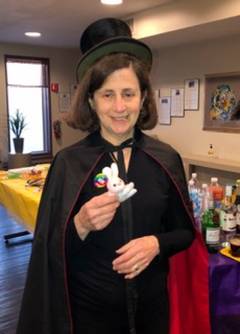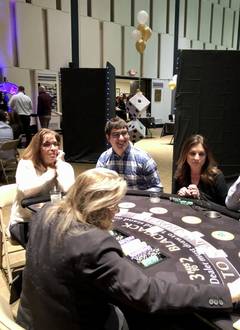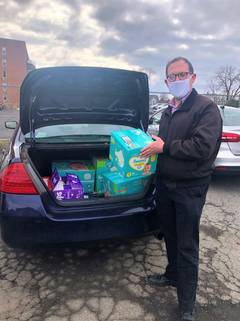Kol Nidre 5779: Neighbor
09/20/2018 08:02:43 PM
| Author | |
| Date Added | |
| Automatically create summary | |
| Summary |
A beautiful day for a neighbor.
Would you be mine?
Could you be mine?
I have always wanted to have a neighbor just like you!
I've always wanted to live in a neighborhood with you.
So let's make the most of this beautiful day,
Since we're together we might as well say,
Would you be mine?
Could you be mine?
Won't you be my neighbor?
Won't you please,
Won't you please?
Please won't you be my neighbor?
Do you remember that song? Like millions of Americans, and like many of you and your children, I grew up watching Mr. Rogers' Neighborhood on public television. I have fond memories of the show, which enchanted generations with its simplicity and sincerity.
Mr. Rogers seems to be having a moment this year, the fiftieth anniversary of the show's first national broadcast. Mr. Rogers this year got a commemorative stamp, a PBS special, a theatrical-release documentary and coming soon, a feature film starring Tom Hanks.
The recent documentary about Mr. Rogers, Won't You Be My Neighbor, offers a behind the scenes look at just how radical, in his own quiet way, Mr. Rogers was. He believed that television could educate children, not just entertain them. He took children and their emotions seriously. He found ways to broach serious topics, like divorce, in honest ways a child could understand.
But Mr. Rogers was actually Rev. Rogers, an ordained Presbyterian minister who had the revolutionary idea to use television as his pulpit. For Mr. Rogers, the “neighborhood” was not just a folksy conceit. It was a highly theological notion. As his friend and fellow minister Rev. George Wirth recalled, “The neighborhood was symbolic of Fred Rogers' desire for people to live together in peace, with respect and love and affirmation, and when things go wrong, forgiveness and reconciliation. ”
For Mr. Rogers, all of his viewers, and everyone he met, were his neighbors. And while the show had no explicit Christian content�"so that everyone would feel welcome in the neighborhood�"the core message of the show emerged from Mr. Rogers' deep, Biblical faith that all people are created in God's image.
This idea was expressed in the show's message to children�"and adults�"that we are each loved and lovable, of infinite value just the way we are. "When we love a person,” Mr. Rogers wrote, “we accept him or her exactly as is: the lovely with the unlovely, the strong along with the fearful, the true mixed in with the façade, and of course, the only way we can do it is by accepting ourselves that way. "
This love of neighbor, of course, has ancient roots. In Mr. Rogers' Christian faith, it comes from the teachings of Jesus and the parable of the Good Samaritan. In that parable (Luke 10:25-37), the truest neighbor was the Samaritan who extended mercy to a Jew in need, even though their people were sworn enemies. The parable implies that the neighbor who we must love crosses any boundaries of difference among people. And that is certainty what Mr. Rogers, the minister, meant when he used the term.
But the commandment to love one's neighbor has its roots in the Torah, in the famous injunction in Leviticus to “Love your neighbor as yourself” (Levi. 19:18). The ancient Rabbi Akiva called this, “the great principle of the Torah,” the underlying moral imperative on which so much of the Torah is based.
This seemingly simple injunction raises many questions on closer inspection. If love is a feeling, can feelings be commanded? And is it really possible to love someone else the way I love myself? Must I give up my own life to save someone else, if it comes to that? If not, then to what point must I give of myself in order to express my love?
These are all important questions. But tonight I want to explore a different question this commandment raises: who counts as our neighbor?
The most limited interpretation in Jewish tradition of who counts as a neighbor belongs to Rashbam, the 12th century commentator who lived in France. He suggested that we need only love our moral peers, people who are as virtuous as we are. By contrast, we are to hate wicked people as an expression of our reverence for God. In this view, who counts as a neighbor is relational and contextual. It must be a person we know well enough such that we could assess their moral character. There is no commandment to love the wicked, or someone we don't really know.
Rashbam's contemporary, the great philosopher and Torah scholar Maimonides, had a wider view. For him, the neighbors we must love are our fellow Jews. “Everyone is commanded,” he wrote in his codification of Jewish law, “to love every single Israelite as he does his own person, for it is written, ‘Love your neighbor as yourself” (Mishneh Torah, Laws of Personal Development (deot) 6:3).
Admittedly, this is a fairly good contextual reading of the Biblical passage. Immediately prior to this commandment, the Torah uses three different words to refer to one's brother, kinsman, and countryman in laws about rebuke, vengeance and bearing a grudge. So it follows that “neighbor” might refer only to those in one's own group. However, there are several instances in the Torah where the word for neighbor specifically refers to a non-Israelite, so the context here is not necessarily conclusive.
Maimonides' interpretation, though, makes sense in a world with clear distinctions between Jews and non-Jews, where non-Jews often treated us with suspicion or worse. But note here that there is no moral judgement involved. We must love anyone bound by our shared covenant with God, no matter how well they live up to that covenant.
There is another view, though, that understands who our neighbor is in a much broader way. Earlier I mentioned that Rabbi Akiva said that loving our neighbor as ourselves is a great principle of the Torah. He probably understood “neighbor” to refer to Jews only or even a smaller group.
But Rabbi Akiva's position was not unanimous. Akiva had a student and colleague named Simeon ben Azzai. Ben Azzai disagreed with his teacher and offered what he called an even greater principle of the Torah, a verse from the book of Genesis: “This is the record of Adam's line.�"When God created man, God made him in the likeness of God” (5:1) (Sifra Kedoshim 2:4).
This verse offers an entirely different basis for moral behavior. We don't owe something to others because they are our neighbors, whomever that may or may not include. Rather, we owe something to others because all of us, as descendants of Adam, were created in God's image. Unlike Akiba's, ben Azzai's principle cannot be narrowed in application. By definition, everyone is created in God's image and thereby of infinite value, whether we consider them our neighbors or not.
Furthermore, the passage in Leviticus that commands us to love our neighbor itself suggests that our moral responsibilities do not end there. A few verses later, we read, “The stranger who resides with you shall be to you as one of your citizens; you shall love him as yourself, for you were strangers in the land of Egypt” (Lev. 19: 34). Already in Rabbi Akiva's day other rabbis noted the parallel between these two commands to love (Sifra Kedoshim 8:4). They are two sides of the same coin: we are commanded to love our neighbors, the people who are like us. And we are also commanded to love the people who are not like us, but who live among us. Why? Because we were once the strangers living on the margins of a foreign society in Egypt. We remember how that felt and how easy it was for the Egyptians to justify enslaving suspicious foreigners.
In a recent book about the historicity of the Exodus, Bible scholar Richard Elliott Friedman argues that the experience of slavery inspired those who compiled the Torah to include this radical notion to love all of our neighbors, especially the strangers who are on the margins of our own society . Friedman also notes how unique the Torah's concern for the stranger is. While many ancient law codes share the Torah's special consideration for widows and orphans, only the Torah contains dozens of laws emphasizing the equal treatment of the stranger .
But this is more than an academic discussion about how to understand an ancient text. Who counts as our neighbor is one of the most urgent political and social questions of our time. In an increasingly small world, where we can talk instantly to anyone around the globe and travel thousands of miles in just a few hours, who is our neighbor? When millions of people around the world have fled poverty, violence and disaster, who is our neighbor? When the literal and metaphorical borders that separate people are increasingly tightened, who is our neighbor?
This year, the American-Israeli writer Yossi Klein Halevi offered us an example of trying to be good neighbor even in very challenging circumstances. Yossi, in whose class I had the pleasure to learn in rabbinical school, published this year the provocatively titled book Letters to My Palestinian Neighbor. For Yossi, the Palestinian neighbor receiving the letters is both real and imaginary.
His Palestinian neighbors are real, in the sense that Yossi can look out his window from the French Hill neighborhood of Jerusalem and see Palestinian areas on the next hilltop, with the separation barrier between them. But the neighbors are also imaginary, as his letters are not addressed to any specific person�"although there's a free Arabic version of the book online, which Yossi hopes will prompt a real dialogue.
But even as his imaginary interlocutor may be a real neighbor on the map, a tremendous divide separates Israelis and Palestinians. Yossi acknowledges this on the first page of his letters. He begins, “Dear Neighbor: I call you "neighbor" because I don't know your name, or anything personal about you. Given our circumstances, "neighbor" might be too casual a word to describe our relationship. We are intruders into each other's dream, violators of each other's sense of home. We are incarnations of each other's worst historical nightmares. Neighbors?... We don't know each other, but our lives are entwined. And so: neighbor” (1).
In his letters, Yossi relates the Jewish-Israeli narrative in a way that he hopes his neighbors can hear, in spite the pain and fear on all sides that results from decades of conflict. He refuses to relinquish or apologize for his own self-understanding as a Jew who has returned home to the land of Israel. Nor does he ask his neighbors to give up on their collective identity, on their story of who they are. “Can we, instead,” he asks, “see each other as two traumatized peoples, each clinging to the same sliver of land…neither of whom will find peace or justice until we make our peace with the other's claim to justice?” (21).
The book as whole demonstrates a great respect for Islam and for Palestinian identity. He calls for Israelis to “recognize the deep pain we've caused in pursuing our security needs” (140). But, correspondingly, he also insists that his neighbors recognize the Jewish connection to the land and the legitimacy of our national aspirations.
This kind of mutual respect is part of neighborly relations. As Yossi writes, “We live in such intimacy, we can almost hear each other breathing. What choice do we have but to share this land…conceptually as well as tangibly. We must learn to accommodate each other's narratives. That is why …I am trying to reach out across the small space and vast abyss that separates your hill from mine” (89). Violent conflict is perhaps the most challenging circumstance in which to love one's neighbor. But Yossi's letters give us an inspiring example of how to try.
Finally, in the last year in our country, the question of who is our neighbor has largely revolved around the contentious topic of immigration. There is certainly a reasonable debate to be had about what our immigration policies should be and how they should be enforced. Comprehensive immigration reform that addresses security, economic and humanitarian concerns has been an elusive goal for decades, responsibility for which politicians across the spectrum share.
But in the last year, we've heard dehumanizing rhetoric about immigrants from the highest levels of our government. We've seen small children separated from their parents at the border, in some cases, never to be re-united. We've seen long-standing, law-abiding residents of this country deported to places they barely remember, leaving their American-born children behind. And we've seen people fleeing violence and persecution around the world told that America is no longer the safe refuge they believed us to be. We've seen a rise of fear, as the strangers in our midst become less and less certain of their place in this country.
I don't have any special wisdom about how to resolve these issues politically. But I do know that the Torah commands us to love our neighbors and to love the stranger in our midst. Right here in Port Chester, our own immigrant neighbors are dealing with all of the issues I mentioned. I hope you'll join me in the coming year to come up with ways that we as a community can be better neighbors to the immigrant communities in Port Chester.
Yom Kippur is one of our most universal of holidays. Unlike Passover or Hanukkah, it doesn't commemorate a specific moment in our people's history. Instead, it focuses on each of us, individually, as we engage in rigorous self-assessment, heshbon ha-nefesh, of our behavior in the past year. It focuses on mitzvoth bein adam l'khaveiro, the commandments regarding a person and his fellow, a person and her neighbor. It focuses on how we treat one another and live up to our many responsibilities. This Yom Kippur, may we all resolve to get better at loving our neighbors as ourselves.
Won't you please,
Won't you please?
Please won't you be my neighbor?
Sat, November 8 2025
17 Cheshvan 5786
Photo Gallery
Photo Albums
Upcoming Events
-
Friday ,
NovNovember 14 , 2025Give Thanks at Tot Shabbat 2025
Friday, Nov 14th 5:30p to 6:30p
-
Tuesday ,
NovNovember 18 , 2025Women's Rosh Chodesh Group
Tuesday, Nov 18th 12:00p to 1:30p
New Women's Rosh Chodesh Group Tuesdays, 12:00-1:30pm Gather with Cantor Sklar and KTI friends at the start of each month of the Hebrew calendar to learn about the themes and traditions of the coming month. Learn from each other, learn more about each other and better understand the women within our tradition. Enjoy music and lunch together! Please a dairy or parve lunch to enjoy at noon, followed by the discussion at 12:30pm. KTI will provide drinks and dessert. RSVP Appreciated -
Wednesday ,
NovNovember 19 , 2025Rabbi, May I? Modern Responsa
Wednesday, Nov 19th 10:00a to 11:30a
Wednesdays, 10 - 11:30 AM, KTI Library Ever since Abraham’s famous argument with God, Judaism has been full of debate. Moses and Korah, David and Nathan, Hillel and Shammai, the Vilna Gaon and the Ba’al Shem Tov, Spinoza and the Amsterdam Rabbis . . . the list goes on. No wonder that Judaism cherishes the expression machloket l’shem shamayim, “an argument for the sake of heaven.” Beyond their historical importance, what makes these disputations so compelling is that nearly all of them, regardless of their epochs, are still being argued. The parade of characters spanning three millennia of biblical, rabbinic, and modern disputation reflects the panorama of Jewish history with its monumental political, ethical, and spiritual challenges. This series will examine Jewish responses to exile from the biblical period to our modern day. Considering texts from all genres of Jewish literary creativity, we will explore how the realities and iterpretaions Join as we re-open these timeless debates that lead us to the core of 3,000 years of Jewish conversation. • Justice: Abraham vs. God (October 19) • Holiness and Authority: Moses vs. Korah (November 9) • Inclusion: The Five Daughters vs. the Twelve Tribes (November 30) • Accountability and Morality: David vs. Nathan (December 21) • Resistance: Ben Zakkai vs. the Zealots (January 18) • Law: Hillel vs. Shammai (February 15) • Spirituality: The Vilna Gaon vs. the Baal Shem Tov (March 15) • Boundaries: Spinoza vs. the Amsterdam Rabbis (April 19) • Religious Evolution: Geiger vs. Hirsch vs. Frankel (May 10) • Zionism: Herzl vs. Wise (May 31) -
Wednesday ,
NovNovember 19 , 2025Wrestling with God
Wednesday, Nov 19th 8:00p to 9:30p
Wrestling with God Wednesdays, 8-9:30 PM Congregants’ homes TBA We need to talk about God. And about how we talk, and don’t talk, about God. It’s a big topic, maybe the biggest. This offering invites adult learners into compassionate inquiry, deepening their relationship to Jewish text through collective exploration. Using the album s*ngs ab-ut g?d [https://open.spotify.com/album/6JEY2AN6awAxNfWwmXX460] by Jewish educator Eliana Light as a starting point, this series blends music, Hebrew text study, and open-ended questions to help participants examine their own connections to the divine. This is sacred work. It’s not about getting it right. It’s about showing up with curiosity, humility, and a willingness to join the long lineage of Jews who wrestle with God. Each session stands alone, but we’d love to have a consistent group as much as possible. Dates: September 10: skyman October 22: shadows November 19: in the silence December 10: if only January 21: lead me back February 11: three steps March 11: beyONEd April 29: the mountains May 20: the name June 17: I rise -
Thursday ,
NovNovember 20 , 2025Coffee with the Rabbi
Thursday, Nov 20th 8:00a to 9:00a
Start your morning with some caffeine and casual or meaningful conversation! Join Rabbi Goldberg for a Coffee Chat! Stop by Rye Ridge Starbucks any of the following Thursdays, between 8-9am: June 12 and 26 July 10 and 24 August 7 and 21 September 4 and 18 October 16 and 30 November 6 and 20 December 4 and 18
Privacy Settings | Privacy Policy | Member Terms
©2025 All rights reserved. Find out more about ShulCloud






